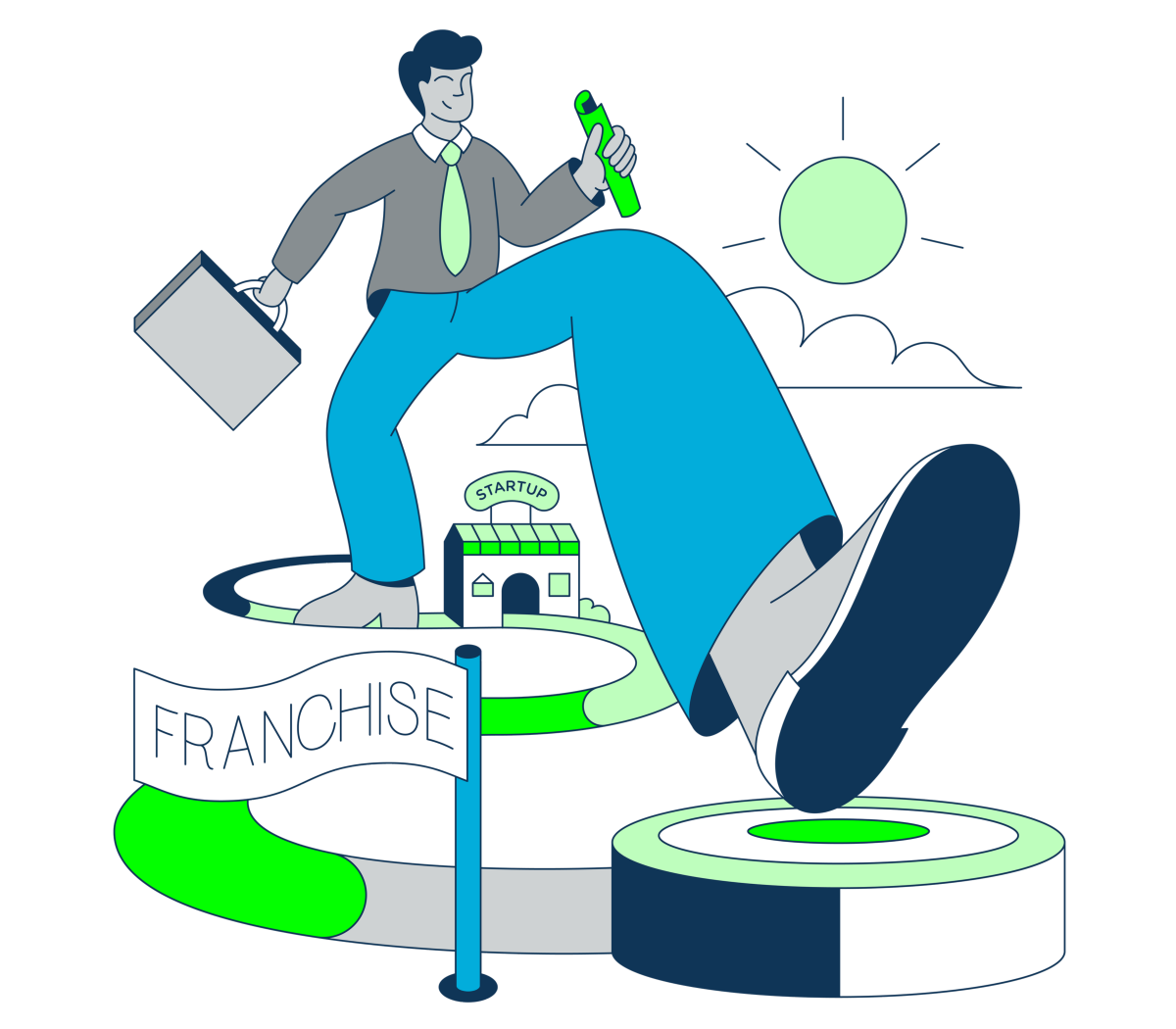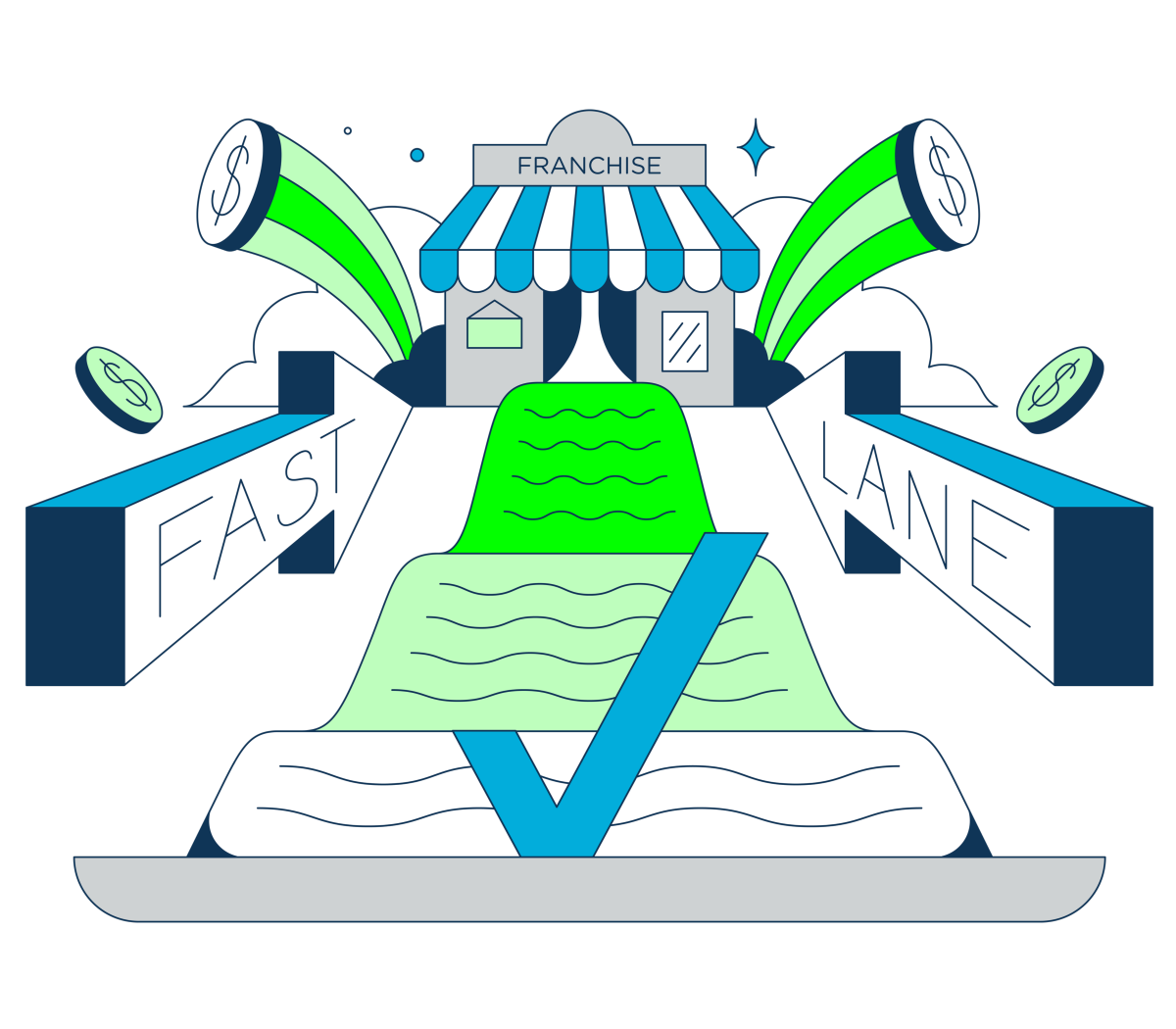Retailvisory home > Basics
Fast-track your business with franchising
The key to growing your brand or becoming your own boss
Starting your own business can be extremely time consuming. People often overlook just how much goes into building a business from the ground up. However, if you’re an enterprising individual who values structure and dreams of one day owning a business, there may be a shortcut to making that dream a reality — franchising.
With insight from Brandy Moore, senior development manager, and Jon Fischer, the head of development at Wetzel’s Pretzels, we’ll explore the ins and outs, benefits, and what it takes to franchise your own business.
So, what is franchising?
According to Moore, franchising is when a person is granted the rights from a business to sell its products or services using its name and model. Franchising is like getting the “instructions” and “permissions” to own a pre-branded business. Put simply, the franchisor is the business’s original owner, and the franchisee buys the rights to sell the company’s established products or services.
 There are many benefits tied to franchising versus starting a new business. When you franchise, you can skip the startup stage and dive directly into business operations. There is instant name recognition and built-in brand loyalty when you franchise an established brand. Franchisors offer training and support as well as help with marketing and advertising. Fischer also states, “In general, if you look at the history of business, franchise businesses tend to have a better success rate just because there’s less risk in them than starting your own business.”
There are many benefits tied to franchising versus starting a new business. When you franchise, you can skip the startup stage and dive directly into business operations. There is instant name recognition and built-in brand loyalty when you franchise an established brand. Franchisors offer training and support as well as help with marketing and advertising. Fischer also states, “In general, if you look at the history of business, franchise businesses tend to have a better success rate just because there’s less risk in them than starting your own business.”
Lastly, Fischer mentions that if you do own your own business and grow that business as much as you can on your own, franchising may be the next step for growth, as franchising allows you to spread the capital burden across more people to further develop the brand.
What’s the lingo?
Before we dive into different types of franchising, let’s break down some of the terms associated with this sort of business:
Franchisor: A company that offers a franchise opportunity as a means of growth.
Franchisee: A person or entity that owns a franchise.
Discovery Day: It varies from franchise to franchise, but discovery day is a time when prospective franchisees usually go to the corporate office, or they attend virtually, and they meet staff and learn more about the franchise. This is the final step before signing a franchise agreement. The franchisee will introduce themselves and explain why they’re interested, and the franchisor will answer any final questions about the franchise. In short, it's a day for franchisors and franchisees to decide whether they will do business together.
FDD (Franchise Disclosure Document): FDDs provide prospective owners with relevant information about the franchisor, the system, and the agreements that they may sign. It’s a legal document you must receive at least 15 days before you can buy a franchise. A FDD may contain information pertaining to the following: how long a company has been in business, license and permit requirements, key executives and management personnel, litigation history and bankruptcy, training programs provided to the franchisee, financial performance and statements, plus a sample copy of the Franchise Agreement. The FDD exists to give potential franchisees an overview of the business.
Item 19: This is a part of the FDD that describes the financial performance of existing franchised units or how a particular franchise might perform in the future. With regard to Item 19, Moore notes, “Because there’s no standard for Item 19 and companies aren’t required to disclose it, the information here can vary significantly from brand to brand.” Franchises in very niche industries, newer franchises, or franchises falling behind the competition may not have an Item 19 in their FDD.
Franchise Agreement: The contract signed between the franchisor and franchisee describing all details and terms of the franchise deal.
Protected Territories: When a franchisee acquires exclusive rights to open franchise units within a defined territory. It’s a rule that prevents anyone else from opening the same franchise in your town.
To learn more business and retail terminology, check out our Retailvisory Glossary.
It's not just fast food
Believe it or not, there’s more to franchises than just coffee shops, burritos, and burgers. Let’s look at the five types of franchising.
- Job Franchise: These franchises provide services such as cell phone repair, cleaning services, plumbing, and event planning. They are typically operated with minimal staff (less than five employees per franchise).
- Product Franchise (aka Distribution Franchise): These are product-driven franchises where the franchisee can operate and sell the franchisor’s products under their own identity instead of using the franchisor’s name. Many car dealerships are this type of franchise.

- Business Format Franchise: This is the most common type and what most people think of when they hear the word franchise. In this type, a parent company provides the usage of its brand and the entire system of operations. Business format franchises include fast food, restaurant chains, gyms, and more.
- Investment Franchise: This is like the business format but on a much larger scale. A major investor will provide the capital and a professional management team to oversee large hotel franchises or gym brands.
- Conversion Franchise: This is a hybrid franchise model where an independent business within the franchisor’s industry signs a franchise agreement to convert their business to a franchise unit. This can be beneficial, as it allows the franchisor the chance to expand quickly and provides the franchisee the benefits of being a part of a well-established brand.
Should you take the leap?
As we’ve discussed, taking on a franchise is a great way to fast-track your career in business ownership. However, franchising often comes with a lot of rules and restrictions that may not appeal to every person with an entrepreneurial spirit.
If you’re someone who likes to innovate, likes to take risks, and always wants to do things on their own terms, franchising isn’t a great option for you, as it doesn’t allow the flexibility or freedom that pure entrepreneurship offers.
If you are someone who values a steady paycheck and prefers to leave work “at work,” you are probably better off working for someone else as opposed to being your own boss.
Franchising works for people who flourish within a framework. These people like flexibility, but also appreciate guidelines. They value “being your own boss” and can handle ebbs and flows of pay. Does this sound like you?
Become your own boss
If you answered yes, next we’re going to explore the steps to becoming a franchisee. The first step is to research. Find a brand or industry you would like to work with. This is when you can visit various discovery days offered by franchisors. Next you need to apply. This is where things get tricky. You must find a franchisor with open availability. Many of the most lucrative franchises have maxed out their potential for growth and rarely accept new applicants. However, new and emerging concepts are always popping up, so keep your eyes peeled for the next big thing!
 After you apply, you need to qualify. The qualification process looks at your leadership and operating experiences, credit score, and background checks. A big part of qualification is ensuring you have enough finances to invest in the franchise or that your net worth is adequate if you apply for loans.
After you apply, you need to qualify. The qualification process looks at your leadership and operating experiences, credit score, and background checks. A big part of qualification is ensuring you have enough finances to invest in the franchise or that your net worth is adequate if you apply for loans.
Once you’re approved, it’s time to select where you will open your franchise unit. Territory offers are often based on existing competition and the franchise’s need for growth in new markets. You may be able to elect a protected territory at this time.
The final step is to undergo training to understand the intricacies of the business and to learn the full breadth of support the franchisor offers. There is often pretraining, which is a formal introduction to the business; training, which is held at the franchisor’s headquarters, combined with in-the-field training that lasts from one week to several months; and post training, which is ongoing field training during the first few months of operation.
Moore says it best: “People franchise with Wetzel’s because of the ease of operations, the cost of goods, the training and support provided, and the solid return on investment.” These are all strong reasons to become a franchisee. However, whether you decided to become a franchisee or even a franchisor, it’s important that you think about your own financial goals, your career goals, and what sort of worker you are. Franchising offers a great deal of flexibility and structure that works for many, but not all.


 There are many benefits tied to franchising versus starting a new business. When you franchise, you can skip the startup stage and dive directly into business operations. There is instant name recognition and built-in brand loyalty when you franchise an established brand. Franchisors offer training and support as well as help with marketing and advertising. Fischer also states, “In general, if you look at the history of business, franchise businesses tend to have a better success rate just because there’s less risk in them than starting your own business.”
There are many benefits tied to franchising versus starting a new business. When you franchise, you can skip the startup stage and dive directly into business operations. There is instant name recognition and built-in brand loyalty when you franchise an established brand. Franchisors offer training and support as well as help with marketing and advertising. Fischer also states, “In general, if you look at the history of business, franchise businesses tend to have a better success rate just because there’s less risk in them than starting your own business.” 
 After you apply, you need to qualify. The qualification process looks at your leadership and operating experiences, credit score, and background checks. A big part of qualification is ensuring you have enough finances to invest in the franchise or that your net worth is adequate if you apply for loans.
After you apply, you need to qualify. The qualification process looks at your leadership and operating experiences, credit score, and background checks. A big part of qualification is ensuring you have enough finances to invest in the franchise or that your net worth is adequate if you apply for loans. 